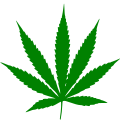Cannabis Social Club
| Part of a series on |
| Cannabis |
|---|
 |
|
Chemistry |
|
Economics |
|
Regional
|
|
A Cannabis Social Club, sometimes called a Teapad, is a model of legal regulation of the cannabis market[1] organised as non-profit organizations in which cannabis is cultivated and enjoyed collectively, usually for the purpose of relaxing or for social communion. These places differ from Cannabis coffee shops in that those are also operating coffee shops and where cannabis is openly sold, usually found in the Netherlands, while social clubs are usually not selling cannabis, and only accessible to members.
History
Beginnings
Cannabis Social Clubs became popular in the United States during prohibition. Cannabis was often used as a legal intoxicant since alcohol was illegal.[2] Teapads were developed as clubs in urban areas where jazz music was performed and cannabis was consumed.[3] Teapads usually catered to those in the jazz scene and were usually furnished comfortably, often playing jazz music.[4] Music in homage from these clubs arose; Gene Krupa even composed an entire album named "Teapad Songs Volume 1".[5] These clubs disappeared after cannabis became illegal.
Today
A Cannabis Social Club is a concept of the pan-European non-government organization ENCOD[6] conceived in 2005 as a way to enable legal production and distribution of cannabis for adults. Cannabis Social Clubs are non-commercial organizations which organize the professional, collective cultivation of very limited amounts of cannabis, just enough to cover the personal needs of their club members.[7]
Cultivation, transport, distribution and consumption are subject to security and quality checks, and are done without publicity or advertisement of any kind. The members finance the system by subscriptions, according to their needs. Each member gets a value card with units, according to his credit, with a maximum limit per month and per year. The members are prohibited from reselling any cannabis purchased, and are required to ensure that it is not consumed by minors.[8] In contrast to the Cannabis Buyers Club a CSC are not limited to medical-only use. Cannabis Social Clubs exist in New Zealand, Spain,[9] Belgium,[10] France,[11] the Netherlands,[12] Slovenia,[13] Austria[14] and Germany.[15] In 2016 four Swiss cities agreed to establish pilot cannabis clubs.[16]
See also
- Cannabis shop
- San Francisco Cannabis Buyers Club
- Allotment (gardening); quite similar except that any crop can be grown in these (not just cannabis)
References
- ↑ European Monitoring Centre on Drugs and Drug Addiction, 05.31.2016, Models for the legal supply of cannabis: recent developments - "Cannabis social clubs: production without retail sale"
- ↑ "Marijuana History". Narconon International.
- ↑ "Marijuana Dictionary". Concept420.
- ↑ https://books.google.com/books?id=2N8bCgAAQBAJ&pg=PA263
- ↑ "I'm Feeling High and Happy - Gene Krupa and his Orchestra (1938)". Herb Museum.
- ↑ "What is ENCOD ? - Encod.org".
- ↑ Drugs, Crime, and Justice: Contemporary Perspectives, Third Edition, p. 534, Larry K. Gaines, Janine Kremling, Waveland Press, 11.12.2013
- ↑ Code of Conduct for EU Cannabis Social Clubs, December 2011
- ↑ Hanf Journal: Spanien: Gerichtsverfahren gegen Cannabis-Anbau-Clubs eingestellt! 13. Decembre 2006
- ↑ Hanf Journal: Freispruch für „Trekt Uw Plant“, 15. March 2010
- ↑ "Bientôt des «cannabistrots» ?". Libération.fr.
- ↑ VOC Nederland: Primeur: kijkje in eerste Nederlandse Cannabis Social Club, Tree of Life Amsterdam, 27.10.2014
- ↑ Medijuana Magazin: "Dem Ganja verdanke ich mein Leben", 5. Februar 2014
- ↑ ORF Salzburg: Marihuana: Club fordert Legalisierung, 14.05.2014
- ↑ Hanf Journal: Die Eastside Growers: Handeln, nicht quatschen, 1.3.2011
- ↑ "'Cannabis clubs' set for four Swiss cities - The Local". Thelocal.ch. 2016-11-18. Retrieved 2016-11-23.